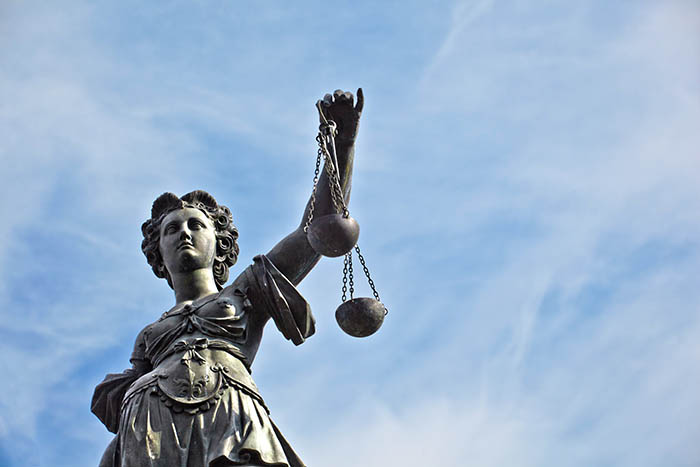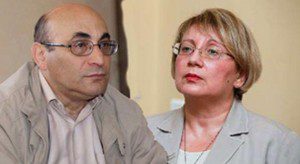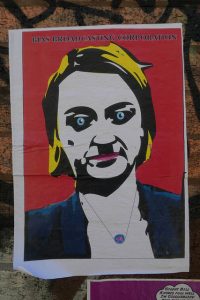28 Sep 2017 | Mapping Media Freedom, Media Freedom, News and features
[vc_row][vc_column][vc_column_text]

Dutch journalists launched a campaign to pressure advertisers into reconsidering advertising on sites that denigrate women.
Journalists are increasingly subjected to online harassment, but when the journalist is a woman misogynistic abuse quickly escalates into gender-based defamation and threats of sexual violence, according to a review of incidents reported to Index on Censorship’s Mapping Media Freedom project.
In the latest case, political editor Laura Kuenssberg, who works for the BBC, was provided with a security detail while she covered the Labour party conference in Brighton. Kuenssberg had been targeted with sexist abuse by individuals who were upset by what they saw as her anti-Labour and anti-Jeremy Corbyn bias.
“Sadly, Laura Kuenssberg’s experience is all too common across the 42 countries that Mapping Media Freedom monitors. Women are often targeted with threats of death and rape. As a society, we only hear about the most high-profile cases, which obscures the fact that this type of misogynistic intimidation is a widespread and pernicious obstacle to the performance of journalists’ professional duties,” Hannah Machlin, project manager at Index on Censorship’s Mapping Media Freedom project, said.
In July, Poland’s state-controlled news channel TVP INFO ran a critical piece about Dorota Bawołek, Brussels correspondent for Polsat, a private Polish TV channel, which led to online harassment.
Bawołek reported that she had received hundreds of insulting messages on social media after TVP INFO accused her of asking provocative questions with intent “to harm Poland”. In the messages Bawołek was called a “prostitute”, “anti-Polish manipulator”, “stupid” and “a snitch”.
In May, there were two cases that exemplify the seriousness of the threats that women journalists receive online.
In Ukraine, journalist Darina Synytska was threatened with rape and kidnapping on Facebook. Responding to a post in which Andriy Knyazev, a resident of Poltava, accused Synytska of passing the personal information of activists, three Facebook users — Ruslan Zarubin, Vitaliy Soloniy, Danylo Plakhov — left threatening comments. Other users were urged to “disappear” the journalist. The journalist union for the region issued a statement of support and solidarity of Synytska, and pledged to monitor the police investigation of the incident. The threats followed Synytska’s investigation of a conflict over a construction site in the centre of Poltava.
In The Netherlands, Loes Reijmer faced a storm of sexual harassment including threats of rape after a popular right-wing blog published her photo with the text: “Would you do her?” Reijmer had previously published critical columns about the controversial site GeenStijl, which has been routinely criticised for sexist content.
The GeenStijl post targeting Reijmer resulted in a public call on advertisers to stop advertising with the outlet backed by an open letter signed by over 100 women from the media and entertainment industries.
“Combating online threats against female journalists will remain at the top of my agenda as it is an integral part of the safety of journalists. There can be no freedom of the media without safety,” said the OSCE Representative on Freedom of the Media Harlem Désir.
“These cases highlight the seriousness of the threats women journalists face in the course of their work. These online campaigns are intended to silence and intimidate women who write critically. The solidarity of unions and a wider community reaction has been crucial in communicating that threats of sexual violence or otherwise are unacceptable,” Machlin said.[/vc_column_text][/vc_column][/vc_row][vc_row][vc_column][vc_basic_grid post_type=”post” max_items=”4″ element_width=”6″ grid_id=”vc_gid:1506602857542-6ca50442-57e4-6″ taxonomies=”8189, 7132″][/vc_column][/vc_row]
13 Sep 2017 | Mapping Media Freedom, media freedom featured, News and features, Ukraine
[vc_row][vc_column][vc_single_image image=”95583″ img_size=”full” alignment=”center” onclick=”custom_link” link=”https://mappingmediafreedom.org/#/”][vc_column_text]Journalists across Ukraine are being suppressed, deported and banned from the country, according to the Index on Censorship’s Mapping Media Freedom project.
Ukraine has imposed a number of restrictions on the media as a response to Russian propaganda in order to protect its national security.
Mapping Media Freedom correspondent Vitalii Atanasov said that “the deportation of journalists is not an effective and justified response to such challenges and threatens press freedom. It is necessary to develop another mechanism to maintain a truly professional and fair media that could compete with all sorts of propaganda and fake news.”
The conflict has led to a rise in anti-media sentiments across Ukraine with some prominent members of the Ukrainian government branding journalists as traitors. Public opinion has swayed over the course of the conflict and the press is often criticised for showing the problems of Ukrainian society.
“Another disturbing trend is that the authorities and their supporters are promoting the idea of the ‘fifth column’, hinting that critical journalism can be a threat inspired from outside. Unfortunately, journalists are an easy target,” Atanasov said
Journalists operating in Ukraine are being blamed for the spread of classified information and for undermining the Ukrainian army. “There have been several cases when journalists were accused of having published classified information, but in the end, the accusations were not confirmed,” Atanasov added.
With both the public and the politicians demonising the press, it has become increasingly dangerous for journalists to work and operate in the Ukraine. The most extreme example of the dangers the media face in Ukraine is the assassination of Pavel Sheremet in July 2016.
Atanasov said that this has led to some self-censorship in the Ukrainian press. “I can assume that some journalists resort to self-censorship in some cases, as they would like to avoid obstacles and problems for their work in the future.”[/vc_column_text][/vc_column][/vc_row][vc_row][vc_column][vc_separator][vc_custom_heading text=”Media freedom is under threat worldwide. Journalists are threatened, jailed and even killed simply for doing their job.” font_container=”tag:h3|text_align:left” use_theme_fonts=”yes” link=”url:https%3A%2F%2Fwww.indexoncensorship.org%2Fcampaigns%2Fpress-regulation%2F|||”][vc_row_inner][vc_column_inner width=”1/2″][vc_column_text]Index on Censorship monitors media freedom in Ukraine and 41 other European area nations.
As of 11/9/2017, there were 296 verified violations of press freedom associated with Turkey in the Mapping Media Freedom database.[/vc_column_text][/vc_column_inner][vc_column_inner width=”1/2″][vc_column_text]Index on Censorship campaigns against laws that stifle journalists’ work. We also publish an award-winning magazine featuring work by and about censored journalists. Support our work today.[/vc_column_text][/vc_column_inner][/vc_row_inner][vc_separator][/vc_column][/vc_row][vc_row][vc_column][vc_column_text]Recent cases reported to Mapping Media Freedom’s database of European area press freedom violations:
Two Russian journalists were deported and banned from Ukraine this August. The first was Tamara Nersesyan, a correspondent for the All-Russian State Television and Radio Company on 15 August. Shortly after her report on the Ukrainian music festival Bandershtat was shown on Channel One she was deported and banned from the country.
On 30 August, Russian State TV Channel One correspondent Anna Kurbatova was deported. A spokesperson for the Security Service of Ukraine (SBU) Olena Gitlyanska wrote that “Russian propagandist Anna Kurbatova was forcibly expelled from Ukraine… she is forbidden to enter the territory of our state for three years.” The reason stated for deportation was “because of activities, which hurt the national interests of Ukraine.” Information about Kurbatova was published on the Myrotvorets because she was judged to be distributing “anti-Ukrainian propaganda” and to be “manipulating significant information”. In 2016, the Myrotvorets leak shared the names of thousands of journalists accredited in the separatist republics. She had recently reported on the deportation of two Spanish journalists and covered Ukrainian Independence Day for Channel One.
Spanish journalists Antonio Pampliega and Manuel Ángel Sastre were deported from Ukraine. Both had been blacklisted in 2015 but granted access to the country after pressure from Spanish authorities. However, on 25 August an SBU spokeswoman said that the journalists were barred because of their “activities that contradict the national interest of Ukraine,” according to the Committee to Protect Journalists. The pair were deported to the Netherlands after a 20-hour detention in Kiev airport. Sastre said the Ukrainian authorities “treated us like criminals”.[/vc_column_text][/vc_column][/vc_row][vc_row][vc_column][vc_basic_grid post_type=”post” max_items=”4″ element_width=”6″ grid_id=”vc_gid:1505295853750-ecfb674d-953f-9″ taxonomies=”6564″][/vc_column][/vc_row]
5 Sep 2017 | Campaigns -- Featured, Statements
[vc_row][vc_column][vc_column_text]
The Hague, 5 September 2017
Dear members of the International Association of Prosecutors members, executive committee and senate,
In the run-up to the annual conference and general meeting of the International Association of Prosecutors (IAP) in Beijing, China, the undersigned civil society organisations urge the IAP to live up to its vision and bolster its efforts to preserve the integrity of the profession.
Increasingly, in many regions of the world, in clear breach of professional integrity and fair trial standards, public prosecutors use their powers to suppress critical voices.
In China, over the last two years, dozens of prominent lawyers, labour rights advocates and activists have been targeted by the prosecution service. Many remain behind bars, convicted or in prolonged detention for legal and peaceful activities protected by international human rights standards, including the Universal Declaration of Human Rights. Azerbaijan is in the midst of a major crackdown on civil rights defenders, bloggers and journalists, imposing hefty sentences on fabricated charges in trials that make a mockery of justice. In Kazakhstan, Russia and Turkey many prosecutors play an active role in the repression of human rights defenders, and in committing, covering up or condoning other grave human rights abuses.
Patterns of abusive practices by prosecutors in these and other countries ought to be of grave concern to the professional associations they belong to, such as the IAP. Upholding the rule of law and human rights is a key aspect of the profession of a prosecutor, as is certified by the IAP’s Standards of Professional Responsibility and Statement of the Essential Duties and Rights of Prosecutors, that explicitly refer to the importance of observing and protecting the right to a fair trial and other human rights at all stages of work.
Maintaining the credibility of the profession should be a key concern for the IAP. This requires explicit steps by the IAP to introduce a meaningful human rights policy. Such steps will help to counter devaluation of ethical standards in the profession, revamp public trust in justice professionals and protect the organisation and its members from damaging reputational impact and allegations of whitewashing or complicity in human rights abuses.
For the second year in a row, civil society appeals to the IAP to honour its human rights responsibilities by introducing a tangible human rights policy. In particular:
We urge the IAP Executive Committee and the Senate to:
- introduce human rights due diligence and compliance procedures for new and current members, including scope for complaint mechanisms with respect to institutional and individual members, making information public about its institutional members and creating openings for stakeholder engagement from the side of civil society and victims of human rights abuses.
We call on individual members of the IAP to:
- raise the problem of a lack of human rights compliance mechanisms at the IAP and thoroughly discuss the human rights implications before making decisions about hosting IAP meetings;
- identify relevant human rights concerns before travelling to IAP conferences and meetings and raise these issues with their counterparts from countries where politically-motivated prosecution and human rights abuses by prosecution authorities are reported by intergovernmental organisations and internationally renowned human rights groups.
Supporting organisations:
Amnesty International
Africa Network for Environment and Economic Justice, Benin
Anti-Corruption Trust of Southern Africa, Kwekwe
Article 19, London
Asian Forum for Human Rights and Development (FORUM-ASIA)
Asia Justice and Rights, Jakarta
Asia Indigenous Peoples Pact, Chiang Mai
Asian Human Rights Commission, Hong Kong SAR
Asia Monitor Resource Centre, Hong Kong SAR
Association for Legal Intervention, Warsaw
Association Humanrights.ch, Bern
Association Malienne des Droits de l’Homme, Bamako
Association of Ukrainian Human Rights Monitors on Law Enforcement, Kyiv
Associazione Antigone, Rome
Barys Zvozskau Belarusian Human Rights House in exile, Vilnius
Belarusian Helsinki Committee, Minsk
Bir-Duino Kyrgyzstan, Bishkek
Bulgarian Helsinki Committee, Sofia
Canadian Human Rights International Organisation, Toronto
Center for Civil Liberties, Kyiv
Centre for Development and Democratization of Institutions, Tirana
Centre for the Development of Democracy and Human Rights, Moscow
China Human Rights Lawyers Concern Group, Hong Kong SAR
Civil Rights Defenders, Stockholm
Civil Society Institute, Yerevan
Citizen Watch, St. Petersburg
Collective Human Rights Defenders “Laura Acosta” International Organization COHURIDELA, Toronto
Comunidad de Derechos Humanos, La Paz
Coordinadora Nacional de Derechos Humanos, Lima
Destination Justice, Phnom Penh
East and Horn of Africa Human Rights Defenders Project, Kampala
Equality Myanmar, Yangon
Faculty of Law – University of Indonesia, Depok
Fair Trials, London
Federation of Equal Journalists, Almaty
Former Vietnamese Prisoners of Conscience, Hanoi
Free Press Unlimited, Amsterdam
Front Line Defenders, Dublin
Foundation ADRA Poland, Wroclaw
German-Russian Exchange, Berlin
Gram Bharati Samiti, Jaipur
Helsinki Citizens’ Assembly Vanadzor, Yerevan
Helsinki Association of Armenia, Yerevan
Helsinki Foundation for Human Rights, Warsaw
Human Rights Center Azerbaijan, Baku
Human Rights Center Georgia, Tbilisi
Human Rights Club, Baku
Human Rights Embassy, Chisinau
Human Rights House Foundation, Oslo
Human Rights Information Center, Kyiv
Human Rights Matter, Berlin
Human Rights Monitoring Institute, Vilnius
Human Rights Now, Tokyo
Human Rights Without Frontiers International, Brussels
Hungarian Civil Liberties Union, Budapest
IDP Women Association “Consent”, Tbilisi
IMPARSIAL, the Indonesian Human Rights Monitor, Jakarta
Index on Censorship, London
Indonesian Legal Roundtable, Jakarta
Institute for Criminal Justice Reform, Jakarta
Institute for Democracy and Mediation, Tirana
Institute for Development of Freedom of Information, Tbilisi
International Federation for Human Rights (FIDH)
International Partnership for Human Rights, Brussels
International Service for Human Rights, Geneva
International Youth Human Rights Movement
Jerusalem Institute of Justice, Jerusalem
Jordan Transparency Center, Amman
Justiça Global, Rio de Janeiro
Justice and Peace Netherlands, The Hague
Kazakhstan International Bureau for Human Rights and Rule of Law, Almaty
Kharkiv Regional Foundation Public Alternative, Kharkiv
Kosovo Center for Transparency, Accountability and Anti-Corruption – KUND 16, Prishtina
Kosova Rehabilitation Center for Torture Victims, Prishtina
Lawyers for Lawyers, Amsterdam
Lawyers for Liberty, Kuala Lumpur
League of Human Rights, Brno
Macedonian Helsinki Committee, Skopje
Masyarakat Pemantau Peradilan Indonesia (Mappi FH-UI), Depok
Moscow Helsinki Group, Moscow
National Coalition of Human Rights Defenders, Kampala
Netherlands Helsinki Committee, The Hague
Netherlands Institute of Human Rights (SIM), Utrecht University, Utrecht
NGO “Aru ana”, Aktobe
Norwegian Helsinki Committee, Oslo
Pakistan Rural Workers Social Welfare Organization (PRWSWO), Bahawalpur
Pensamiento y Acción Social (PAS), Bogotá
Pen International, London
People’s Solidarity for Participatory Democracy (PSPD), Seoul
Philippine Human Rights Advocates (PAHRA), Manila
Promo-LEX Association, Chisinau
Protection International, Brussels
Protection Desk Colombia, alianza (OPI-PAS), Bogotá
Protection of Rights Without Borders, Yerevan
Public Association Dignity, Astana
Public Association “Our Right”, Kokshetau
Public Fund “Ar.Ruh.Hak”, Almaty
Public Fund “Ulagatty Zhanaya”, Almaty
Public Verdict Foundation, Moscow
Regional Center for Strategic Studies, Baku/ Tbilisi
Socio-Economic Rights and Accountability Project (SERAP), Lagos
Stefan Batory Foundation, Warsaw
Suara Rakyat Malaysia (SUARAM), Petaling Jaya
Swiss Helsinki Association, Lenzburg
Transparency International Anti-corruption Center, Yerevan
Transparency International Austrian chapter, Vienna
Transparency International Česká republika, Prague
Transparency International Deutschland, Berlin
Transparency International EU Office, Brussels
Transparency International France, Paris
Transparency International Greece, Athens
Transparency International Greenland, Nuuk
Transparency International Hungary, Budapest
Transparency International Ireland, Dublin
Transparency International Italia, Milan
Transparency International Moldova, Chisinau
Transparency International Nederland, Amsterdam
Transparency International Norway, Oslo
Transparency International Portugal, Lisbon
Transparency International Romania, Bucharest
Transparency International Secretariat, Berlin
Transparency International Slovenia, Ljubljana
Transparency International España, Madrid
Transparency International Sweden, Stockholm
Transparency International Switzerland, Bern
Transparency International UK, London
UNITED for Intercultural Action the European network against nationalism, racism, fascism and in support of migrants, refugees and minorities, Budapest
United Nations Convention against Corruption Civil Society Coalition
Villa Decius Association, Krakow
Vietnam’s Defend the Defenders, Hanoi
Vietnamese Women for Human Rights, Saigon
World Organisation Against Torture (OMCT)
Zimbabwe Lawyers for Human Rights, Harare[/vc_column_text][/vc_column][/vc_row][vc_row][vc_column][vc_basic_grid post_type=”post” max_items=”4″ element_width=”6″ grid_id=”vc_gid:1504604895654-8e1a8132-5a81-8″ taxonomies=”8883″][/vc_column][/vc_row]
13 Jun 2017 | Azerbaijan, Azerbaijan Letters, Campaigns, Campaigns -- Featured, Statements
[vc_row][vc_column][vc_column_text]

Arif and Leyla Yunus (Photo: HRHN)
Dear Secretary General,
We, the undersigned organisations call on Interpol, and all other relevant bodies and authorities to act with due diligence in accordance with Interpol’s constitution to prevent the misuse of Interpol alerts against Leyla Yunus and Arif Yunus, two prominent human rights defenders from Azerbaijan. The couple currently resides in exile in the Netherlands, where they were granted refugee status in 2016. Detailed information about their human rights activism can be found below. Interpol’s constitution prohibits the misuse of its systems for political purposes and in ways that violate human rights.
Leyla and Arif Yunus were arrested on 30 July and on 5 August 2014 respectively. Azerbaijani authorities prosecuted both on politically motivated charges of large-scale fraud, while also charging Leyla with bogus forgery, tax evasion, and illegal entrepreneurship offences. In August 2015, a court sentenced Leyla Yunus to eight and half years imprisonment, and Arif Yunus to seven, having convicted them of tax evasion and other economic crimes. Authorities also filed treason charges against them both, but later suspended the investigation.
On 9 December 2015, Leyla Yunus was released from detention and her eight-and-a-half-year prison sentence was converted into five-year suspended sentence, following a decision by the Baku City Court of Appeal on the basis of a request from her lawyers with reference to her deteriorating health condition. Similarly, Arif Yunus’s prison term was changed to a five-year suspended sentence. He was placed under house arrest on 12 November 2015. In April 2016 the Azerbaijani government allowed the couple to travel abroad to receive needed medical treatment for conditions they had developed during their prison ordeal.
Due to the politically motivated nature of their prosecution, in spring 2016 the couple received political asylum in the Netherlands.
When Leyla and Arif left Azerbaijan, their cassation appeal was still pending before the Supreme Court. On 27 December 2016, the Supreme Court sent the case back for re-examination to the Baku Appeal Court. On 17 May 2017, at the hearing at the Baku Appeal Court, the Yunus’s lawyer asked the court to ensure the couple’s participation in the proceedings via internet. The court rejected the petition. The same day, the court ordered the couple to return to the country to participate in the subsequent court hearings in their case. The court hearing was rescheduled from 31 May to 3 July 2017.
The arrest of Leyla and Arif Yunus happened against the backdrop of a rapidly deteriorating human rights situation in Azerbaijan. Since 2014, several dozens of human rights defenders, lawyers and journalists and opposition politicians have been arrested and prosecuted on politically-motivated grounds. The arrests and other steps by the government of Azerbaijan have served to severely close the space for independent activism, critical journalism, and opposition political activity in the country.
Azerbaijan has been ranking as Not Free in the Freedom in the World rankings of the Freedom House for several years, scoring the lowest on the political rights and civil liberties. In the latest Freedom of the Press rankings, Azerbaijan scored the 162nd place out of 180 countries.
The United Nations Working Group on Arbitrary Detention recently concluded an official visit to Azerbaijan. In a statement issued at the end of its visit, the Working Group concluded that human rights defenders, journalists, and political and religious leaders continue to be detained on criminal or administrative charges in the country as a way to impair their exercise of basic human rights and fundamental freedoms and to silence them. The Working Group stressed that these practices constitute abuse of authority and violate the principle of the rule of law that Azerbaijan has undertaken to comply with. One of the cases highlighted by the Working Group is that of Leyla and Arif Yunus. In his recent report to the Human Rights Council, the United Nations Special Rapporteur on human rights defenders, Michel Forst also drew attention to the legal persecution of human rights defenders in Azerbaijan.
An official request has been made to Interpol on 12 June 2017 by the European Human Rights Advocacy Centre (EHRAC), which represents the couple, to inquire about the existence of any alerts made against Leyla and Arif Yunus by the Azerbaijani Government and to request Interpol to take all appropriate steps to prevent the dissemination of such an alert. Taking into consideration the very poor human rights record in Azerbaijan and the routine practice of politically-motivated prosecutions by the authorities, any attempt by the Azerbaijani authorities to use Interpol alerts against Leyla Yunusova and Arif Yunusov would violate the prohibition in Interpol’s constitution against the misuse of its systems for political purposes and in ways that violate human rights. Interpol should, therefore, refuse any request from the Azerbaijani authorities to use the Interpol Information System against Leyla Yunusova and Arif Yunusov, and we call on all relevant national bodies and authorities not to act on Interpol alerts against them, in case they are issued.
Short biographies:
Leyla Yunus is a long time human rights defender and activist since the late Soviet era. She is the director of the Institute for Peace and Democracy, a human rights organisation in Azerbaijan that focused on political prisoners, women’s rights and other issues. For almost 30 years Leyla Yunus and Arif Yunus have been involved in compiling comprehensive lists of political prisoners in Azerbaijan. Leyla Yunus is a Knight of the French Legion of Honor, winner of the International Theodor Hacker award, Laureate of the Polish Sergio Vieira de Mello Award and a finalist of the 2014 Sakharov Prize of the European Parliament.
Arif Yunus is a prominent Azerbaijani historian and human rights activist. He is the chairperson of the Conflict and Migration departments at the Institute for Peace and Democracy. Throughout his career, Arif has published over 30 books and several articles on the history of Azerbaijan and on Azerbaijani-Armenian relations. In his work, he has promoted dialogue between intellectuals from Azerbaijan and Armenia, and for many years has advocated for a peaceful resolution of the conflict in Nagorno-Karabakh. He has supported numerous victims of torture and spoken out repeatedly against politically motivated detentions.
The list of signatory organisations:
1. Amnesty International
2. Association UMDPL (Ukraine)
3. Bir Duino
4. Centre for the Development of Democracy and Human Rights
5. Committee Against Torture
6. Crude Accountability
7. Fair Trials
8. FIDH and OMCT under “Observatory for the protection of human rights defenders”
9. Freedom Files
10. Front Line Defenders
11. Helsinki Foundation for Human Rights
12. Human Rights House Foundation
13. Human Rights Watch
14. Index on Censorship
15. International Partnership for Human Rights
16. Institute for Reporters’ Freedom and Safety (IRFS)
17. Kazakhstan International Bureau for Human Rights and the Rule of Law
18. KRF Public Alternative
19. Legal Policy Research Centre
20. Public Verdict
21. Regional Center for Strategic Studies
22. The Barys Zvozskau Belarusian Human Rights House
23. The Georgian Centre for Psychosocial and Medical Rehabilitation of Torture Victims
24. The Netherlands Helsinki Committee
25. Women of the Don[/vc_column_text][/vc_column][/vc_row][vc_row][vc_column][vc_basic_grid post_type=”post” max_items=”12″ style=”load-more” items_per_page=”4″ element_width=”6″ grid_id=”vc_gid:1497944614160-ae286e6b-fd24-9″ taxonomies=”7145″][/vc_column][/vc_row][vc_row full_width=”stretch_row_content_no_spaces” content_placement=”middle”][vc_column][vc_single_image image=”91122″ img_size=”full” alignment=”center” onclick=”custom_link” link=”https://www.indexoncensorship.org/2017/05/stand-up-for-satire/”][/vc_column][/vc_row]




